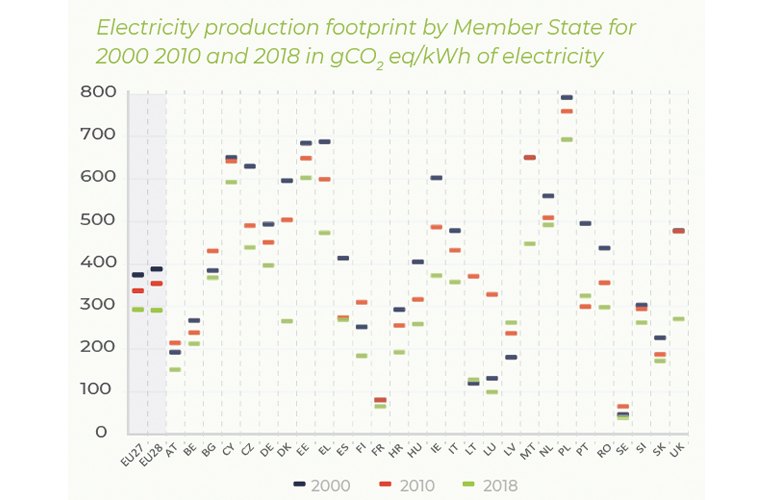While renewables account for 33 percent of the EU-28 gross power generation mix in 2018, 67 percent of the electricity was still generated using non-renewable sources such as coal, natural gas, and nuclear. In addition, despite substantial efforts undertaken in recent years, the EU's electricity carbon footprint average remains high, reaching 292 gCO2eq/kWh in 2018, a new Bioenergy Europe report finds.

For the second time since its launch in 2007, the 2020 Statistical Report published by Bioenergy Europe (previously known as AEBIOM) will be split into different publications, each one covering a different aspect of bioenergy. First out is the Bioelectricity Statistical Report 2020 that provides an in-depth analysis of the role of bioenergy in the decarbonisation of the EU’s power grid.
According to the report, bioenergy accounted for 5.8 percent of the gross power generated in 2018 in the EU-28. Bioenergy Europe notes that despite substantial efforts undertaken in recent years, the EU’s electricity carbon footprint remains high, reaching a 292 gCO2eq/kWh average in 2018.
However, there is a major disparity between the Member States with several countries above the EU-28 2018 average, three of which – Cyprus, Estonia and Poland – had a carbon footprint of 600 gCO2eq/kWh or higher.
According to Bioenergy Europe, the numbers are clear – to achieve the full decarbonisation of its power system and its economy, the EU needs a strategic vision and concrete measures to support a profound change in the Members States’ energy mix.
More electricity from biomass needed for grid stability
Bioenergy Europe highlight that only a combination of advanced clean technologies – that includes bioenergy – can ensure a stable and secure supply of clean electricity. Bioelectricity offers the advantage of complementing variable renewables, being a stable, flexible, and cost-effective source of energy.
Furthermore, bioelectricity is becoming increasingly efficient, with 71 percent electricity generated from modern combined heat and power plants (CHP). In comparison, for electricity generation from conventional thermal sources, CHP accounts only for 28 percent.

Effective energy mix should be prioritized through long-term political commitment and investments in order to secure the stability of the power system at all times. Bioelectricity and its ability to produce on-demand is a perfect match with intermittent renewables such as wind or solar PV.
This network stabilization role should be more recognized says Bioenergy Europe and should be coupled with adequate financial support aimed at efficient technologies and sustainable-fuel demonstration projects. The full market uptake of bioelectricity technologies represents a concrete answer to today’s challenges offering a viable and sustainable solution.
The benefits of a coherent and effective energy transition, which sees bioelectricity as a key piece of the puzzle are manifold: environmental benefits, secure energy system, but also ensure jobs creation and economic development at the local and regional levels.
The economic recovery after the pandemic should be seen as a strategic opportunity. Financing instruments should be used to accelerate the decarbonization of Europe. Bioenergy is part of the solution to phase out fossil fuels, being technically mature, economically affordable, and socially fair, commented Jean-Marc Jossart, Secretary-General, Bioenergy Europe.


